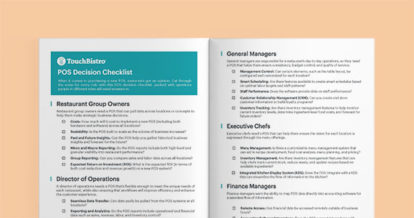Download this free checklist to learn how to choose a POS system for your restaurant.
If you want to know how to choose a POS system for your restaurant, you’ve come to the right place. A new point of sale (POS) system impacts everyone in your venue, from the owner to the host. And, when it comes to switching POS systems, everyone’s got an opinion. But too many opinions is a lot like having too many cooks in the kitchen: chaotic, at best.
To make sure you don’t end up with a case of decision paralysis, involve only the most important stakeholders in the decision. This free guide for how to choose a POS software system has curated a list of exactly who should be involved in this process.
While each of these stakeholders has their own list of “must-haves” and “nice-to-haves”, this POS checklist will help you cut through the noise and choose a system that makes everyone happy. This guide takes you through the most critical questions these decision-makers need to answer when choosing a new system.
Here’s a preview of the checklist, including who you should involve in your decision and things to look for when buying a POS system for your restaurant.
How to Buy a POS for a Restaurant: Who to Consult & What’s Important to Them
If you want to know how to choose a restaurant POS system, you have to start by knowing who your stakeholders are and how the POS will affect them. Consult restaurant group owners, directors of operations, general managers, executive chefs, finance managers, and restaurant managers to cover your bases.
Restaurant Group Owners
Restaurant group owners need a POS that can pull data across locations or concepts to help them make strategic business decisions. They’re most concerned with a POS system’s costs, scalability, and what kind of a return on investment it’ll generate.
Directors of Operations
A director of operations needs a POS that’s flexible enough to meet the unique needs of each restaurant, while also ensuring that workflows will improve efficiency and enhance the customer experience. This role wants a POS that makes data sharing easy between locations, offers remote access capabilities, and has a variety of access permissions.
General Managers
General managers are responsible for a restaurant’s day-to-day operations, so they need a POS that helps them ensure consistency, budget control, and quality of service. Other considerations for GMs include inventory tracking and staff scheduling capabilities.
Executive Chefs
Executive chefs need a POS that can help them ensure the vision for each location is expressed through the menu offerings. In addition to menu management features, executive chefs need an integrated kitchen display system and inventory management tools.
Finance Managers
Finance managers want the ability to map POS data directly into accounting software for a seamless flow of information. Payroll integrations and in-depth financial reporting capabilities sweeten the deal for these stakeholders.
Restaurant Managers
Restaurant managers need a POS that’s easy for staff to use and helps to deliver the highest quality customer experience. They’ll want a system that comes with tableside ordering to improve service. Table and staff management features are also a must-have for managers.
So, how do you choose a POS software system that makes everyone happy without driving yourself batty during the decision-making process? Find out by downloading and following our free POS checklist.




